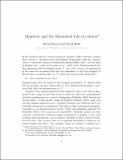Files in this item
Monsters and the theoretical role of context
Item metadata
| dc.contributor.author | Rabern, Brian | |
| dc.contributor.author | Ball, Derek | |
| dc.date.accessioned | 2019-10-05T23:45:40Z | |
| dc.date.available | 2019-10-05T23:45:40Z | |
| dc.date.issued | 2019-03-22 | |
| dc.identifier | 249597186 | |
| dc.identifier | 466641ab-0867-45fe-ab96-f35d9646386d | |
| dc.identifier | 85063328067 | |
| dc.identifier | 000462056000007 | |
| dc.identifier.citation | Rabern , B & Ball , D 2019 , ' Monsters and the theoretical role of context ' , Philosophy and Phenomenological Research , vol. 98 , no. 2 , pp. 392-416 . https://doi.org/10.1111/phpr.12449 | en |
| dc.identifier.issn | 0031-8205 | |
| dc.identifier.other | ORCID: /0000-0002-7229-3282/work/66398268 | |
| dc.identifier.uri | https://hdl.handle.net/10023/18617 | |
| dc.description.abstract | Kaplan (1989) famously claimed that monsters—operators that shift the context—do not exist in English and “could not be added to it”. Several re- cent theorists have pointed out a range of data that seem to refute Kaplan’s claim, but others (most explicitly Stalnaker 2014) have offered a principled argument that monsters are impossible. This paper interprets and resolves the dispute. Contra appearances, this is no dry, technical matter: it cuts to the heart of a deep disagreement about the fundamental structure of a semantic theory. We argue that: (i) the interesting notion of a monster is not an operator that shifts some formal parameter, but rather an operator that shifts parameters that play a certain theoretical role; (ii) one cannot determine whether a given semantic theory allows monsters simply by look- ing at the formal semantics; (iii) theories which forbid shifting the formal “context” parameter are perfectly compatible with the existence of monsters (in the interesting sense). We explain and defend these claims by contrasting two kinds of semantic theory—Kaplan’s (1989) and Lewis’s (1980). | |
| dc.format.extent | 352213 | |
| dc.language.iso | eng | |
| dc.relation.ispartof | Philosophy and Phenomenological Research | en |
| dc.subject | Semantics | en |
| dc.subject | Content | en |
| dc.subject | Monsters | en |
| dc.subject | Context sensitivity | en |
| dc.subject | David Kaplan | en |
| dc.subject | David Lewis | en |
| dc.subject | Context shifting | en |
| dc.subject | B Philosophy (General) | en |
| dc.subject | T-NDAS | en |
| dc.subject | BDC | en |
| dc.subject | R2C | en |
| dc.subject.lcc | B1 | en |
| dc.title | Monsters and the theoretical role of context | en |
| dc.type | Journal article | en |
| dc.contributor.institution | University of St Andrews. Philosophy | en |
| dc.contributor.institution | University of St Andrews. Arché Philosophical Research Centre for Logic, Language, Metaphysics and Epistemology | en |
| dc.identifier.doi | 10.1111/phpr.12449 | |
| dc.description.status | Peer reviewed | en |
| dc.date.embargoedUntil | 2019-10-06 | |
| dc.identifier.url | http://semanticsarchive.net/Archive/WU5MjQwN/monsters-theoretical-supplement.pdf | en |
This item appears in the following Collection(s)
Items in the St Andrews Research Repository are protected by copyright, with all rights reserved, unless otherwise indicated.

